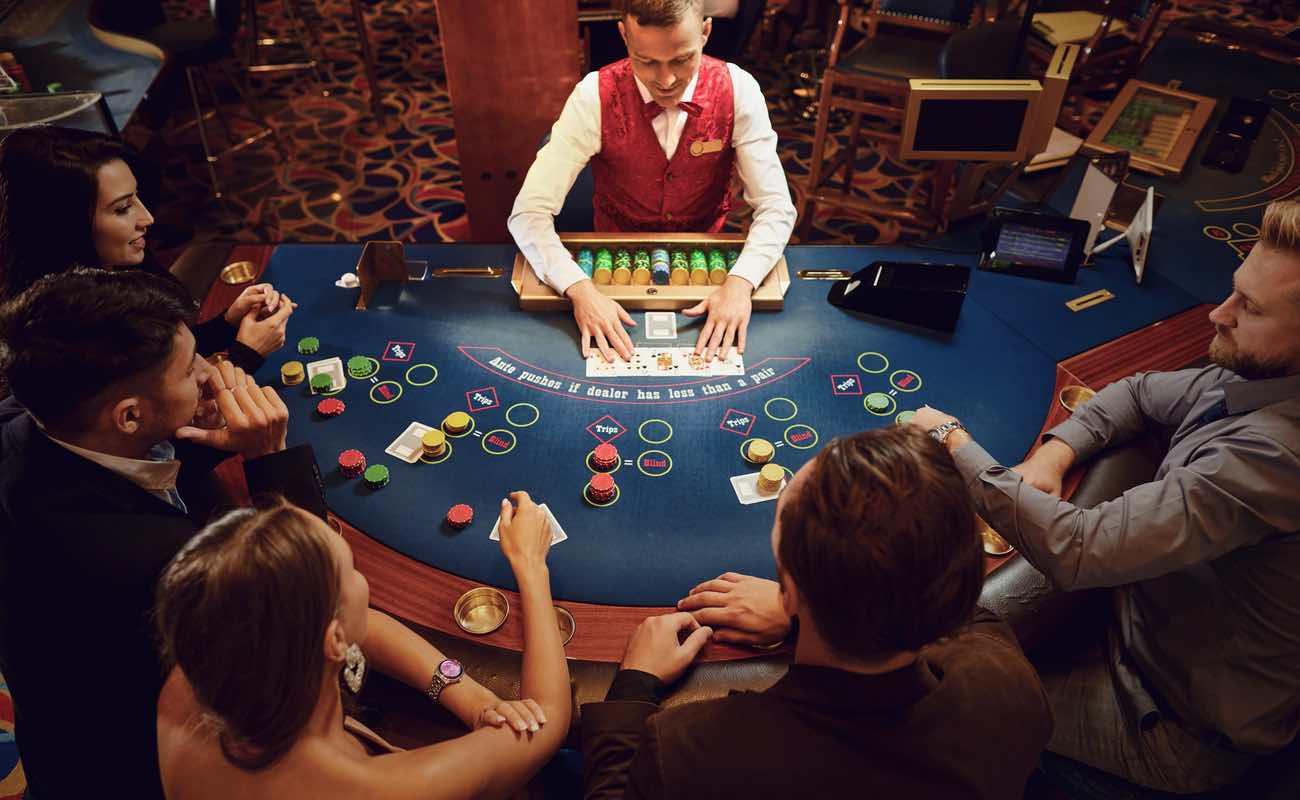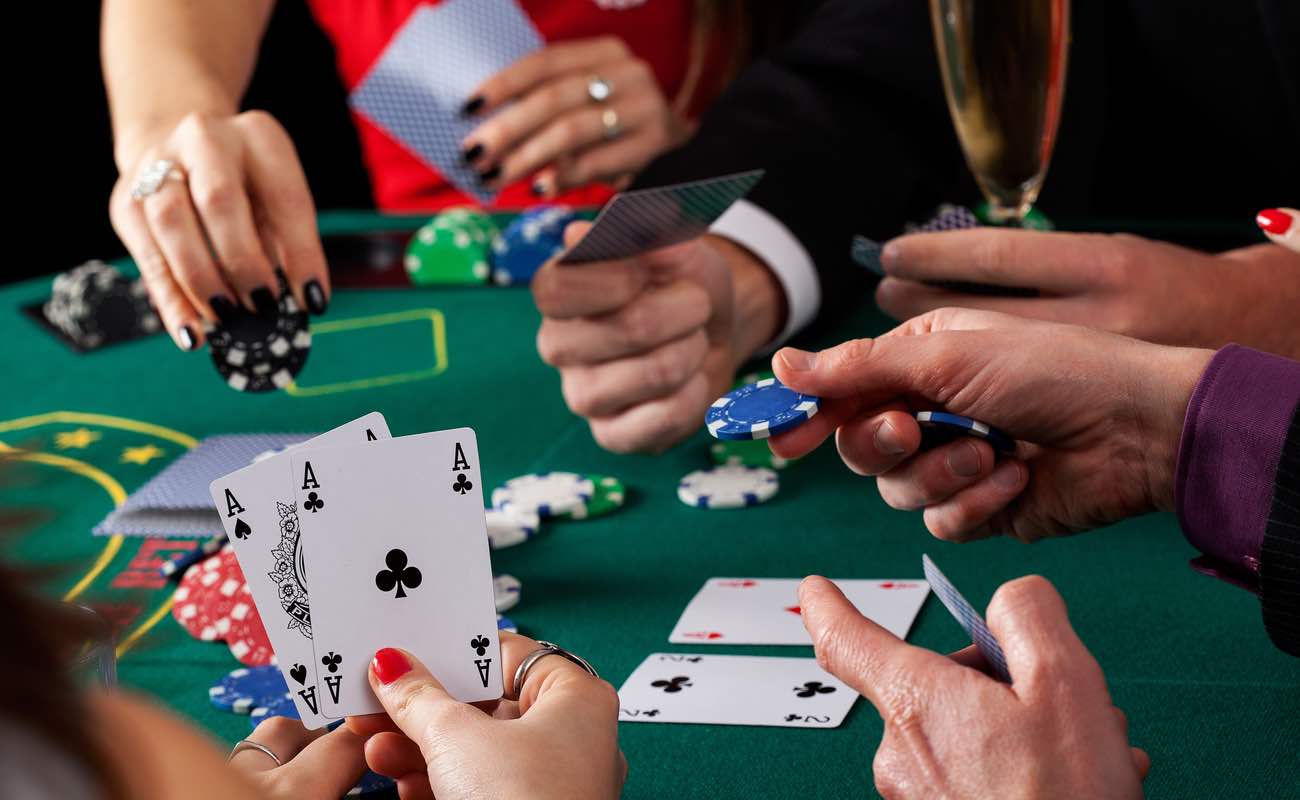
If you’ve played poker at a table, you’ve probably been in this situation once or twice before. As you look around the table, you happen to notice one of your opponent’s hands exposed and you see their playing cards.
In light of this new information, you know your next move should definitely be a raise. Their Texas Hold’em poker hand is weaker than yours. But should you exploit the player and use what you saw to win the pot or save yourself from losing? Or should you fold and let them know?
A situation like this can be awkward. But to some players, it might be seen as a lucky break. Let’s examine the proper poker table etiquette to see what you should do when this happens. (Note that this situation will only come about at brick-and-mortar games: In online poker games, of course, your cards are always hidden – even if you’re particularly clumsy with your hand.)
Poker’s Unwritten Rules and Table Etiquette
Accidentally seeing your opponent’s hand is not a black-and-white issue. And it shouldn’t be confused with showing a hand at the end of a round or mucking. Since it isn’t your fault, you cannot be punished or penalized for it. How you react in this situation will depend on your own views of what it means to respect your fellow players. Let’s look at two unwritten poker rules that come into play in a situation like this.
Unwritten Rule 1: Don’t Angle Shoot
Angle shooting is when a player intentionally makes a move to take advantage of less experienced players or an unusual situation at a poker table. It’s using unfair tactics that lie on the border between legal and illegal poker behavior. Even though there aren’t any clear-cut rules about angle shooting in casinos, this kind of behavior is one of the worst things you can do at a table. Thankfully, most angle shooting tactics are harder to do in poker games online.
Angle shooting is not considered cheating, but it displays terrible casino poker table etiquette. Examples of angle shooting would be acting out of turn, hiding your high-value chips to pretend you have a shorter stack or pretending to call to see your opponent’s reaction. But the most pertinent example of angle shooting is trying to see another player’s hole cards.
Yes, seeing your opponent’s hand was an accident. But now you’re in a position where it might seem as though you intentionally tried to sneak a peek at them, especially if you remain silent after having done so. If you’re dealing with an inexperienced player or a player who is unaware that their cards are visible to you, not notifying them would count as angle shooting. You wouldn’t be breaking any rules, but it’s really poor poker etiquette.
Unwritten Rule 2: Never Show Your Hand to Anyone

This one is actually a written rule in some casinos. It’s easy to put all the fault and blame on the person who accidentally saw their opponent’s cards. But making sure your hole cards are hidden is every player’s own responsibility.
Even if you’ve already folded, revealing your holding to opponents who are still playing is forbidden and can incur a penalty. It’s not advised to talk to players about their hands or ask for advice about your own hand – indeed, you can often be penalized for this kind of behavior as many professionals have been for major transgressions in some of the biggest poker scandals ever seen. Even if you’re playing live poker online, don’t use the chat room to share your hand or ask questions about possible moves.
In poker, if any player sees more information or an extra card than they were supposed to, then this knowledge must be revealed or given to every other player on the table to level the playing field. Making sure your hole cards are hidden protects you from being exploited by your opponents, but it also prevents any player from having an unfair advantage. Players should win on their own merit, ability and luck, not because the person sitting next to them doesn’t know how to discreetly view or hold their cards.
When Is It Acceptable To Show Your Cards?
Knowing when to show your cards is also important and beginners should be aware of these generally accepted situations before playing. The rules for showing your hand can vary depending on the specific game, but here are the most common times you’re allowed to show them.
Showdown
After the final betting round, if two or more players remain, a showdown occurs, where players reveal their cards. The player who made the last aggressive action (bet or raise) during the final betting round is usually the first to show their hand. If there was no bet on the final round, the player to the left of the dealer button is the first to show. The showdown continues clockwise.
Folding
If you fold, you are not obligated to show your hand. In fact, it’s generally against poker etiquette to do so.
All-In
If a player goes all-in and there is no more betting to happen (because no one else has any money to bet,) the players often show their hands before the remaining community cards are dealt.
Voluntary Show
Some players choose to show a winning hand after all other players have folded to a bet. This is usually a strategy move to project a certain image (like being loose or tight.)
In all cases, it is always important to be aware of the specific house rules where you are playing.
What to Do if You’ve Seen Your Opponent’s Cards
Now that you’re aware of when it is acceptable for you or your opponents to show their cards, let’s see what happens when you see them by mistake or if they show them to you when they shouldn’t.
What Can You Do?
First, let’s ask what “can” you do if you see your opponent’s cards? Etiquette and manners aside, you could keep playing and use the information to your advantage. After all, it’s their fault, not yours. No poker rule can be used against you and you won’t be penalized.
What Should You Do?

Here’s an invaluable poker tournament tip: Do the right thing. Sportsmanship goes a long way and top poker players display a keen respect for the game and their opponents. Without etiquette and mutual consideration, poker would be an entirely different game, no matter whether you play poker online or at live tables. You’re not just at the felt to play for money and have fun. You’re there to engage and test your skills against other players.
The right thing to do is to always notify the player the first time you see their cards. Tell them to be careful. You can also fold to ensure the game restarts on a clean slate. If you’re dealing with an inexperienced player and it happens again, notify them once more that their cards are exposed.
However, poker is a game where you try to outsmart your opponents. If you’ve warned a player a few times that you can see their cards and nothing changes, you can continue playing. After all, you can’t keep folding for an entire game to accommodate one player. But however often you feel you should warn a player (or fold as a result of seeing their cards) is up to your discretion. It is considered poor poker etiquette to continue playing and exploit their mistake without first notifying them or giving them a chance.
What Should You Do in Poker Tournaments?
In the case of poker tournaments, notify the whole table that you saw your opponent’s cards and what they were. Depending on the casino or table rules, the game can continue or the dealer may have to deal again. Seeing your opponent’s card isn’t necessarily unfair to them since it’s their responsibility to ensure they are hidden. However, it is unfair to other players who don’t have the same information as you do. A quick way to rectify this is to tell everybody what you saw and let the house rules or the group decide what to do next.
Whether you play at traditional casinos or enjoy poker online, a game you win using your own intellect, strategy and guile is better than one you won because you saw your opponent’s cards. So just remember: The most respectable approach to take when you see your opponent’s hand is to notify the player or the rest of the table. And you’ll be able to relax, knowing you did the right thing.
Play Your Cards Right With Borgata Online Poker Tournaments
You don’t have to go pro to start competing in online poker tournaments. When you join Borgata Online, you can play poker with daily tournaments and games always available. Whether you’re a beginner or a seasoned player, Borgata Online’s intuitive updated software always delivers an easy and unbeatable online poker experience.
Register with Borgata Online to enjoy poker and many other casino table games, as well as scores of exciting slot titles with every theme imaginable.
